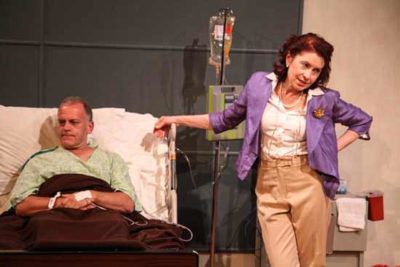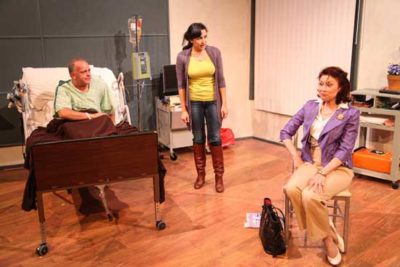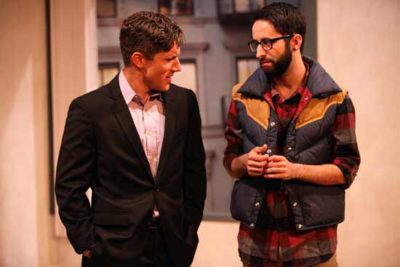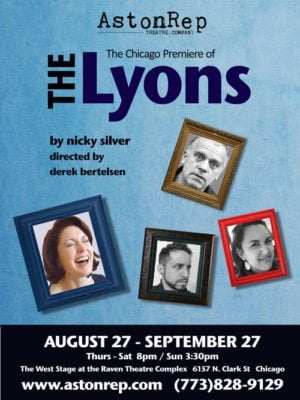The Lyons
Directed by Derek Bertelsen
Produced by Aston Rep, Chicago
Playwright Nicky Silver has a certain style of family-based humor he’s used since his career took off in the early 90s. He writes exaggeratedly vicious people, has them fight, and expects it to be heart-warming and funny. His 2011 play The Lyons is significant for having been his first to run on Broadway, which is how I imagine it came to the Aston Rep Theatre Company’s attention for this Chicago premiere. In a short interview inserted in the program, Silver says he wrote the play in a month, and wanted to demonstrate there are alternate routes to happiness than through the family. While great plays have been written in shorter timespans, either my sense of humor is totally incompatible with Silver’s, or this production didn’t capture what others see in him. I found nothing heart-warming or hopeful in it, and very little funny.

We open in a hospital room, designed by Jeremiah Barr as one of the most depressing sets you’ll ever see. The middle-aged man in bed, Ben (Scott Olson) is dying, and spending his last days cussing out his wife, Rita (Susan Fay), while she gloats over how she’ll redecorate their house when he’s gone. She points out that for someone with terminal cancer, he has quite the set of lungs on him. They are awaiting the arrival of their adult offspring, who have not been informed that Ben was even sick, although Ben isn’t particularly fond of his son, Curtis (Matthew Harris), due to his being gay and creepy. First to arrive is their daughter, Lisa (Aja Wiltshire), a divorced mother and recovered alcoholic, who both parents are plainly disinterested in, though Rita gets some amusement out of suggesting that Lisa’s elder son is probably retarded. Curtis’s arrival sparks more tension, since Rita dotes on him even though Ben despises him. Once they’ve been together for a little while, Silver attempts an abrupt tone shift to poignant matters, like who has seriously contemplated murdering who, who got beaten by an ex they’re still in love with, and who lied about ever feeling love at all.

In Act II, Ben is finally dead, but his survivors are as screwed up and nasty as ever. After falling off the wagon, Lisa has a new boyfriend, who is also her AA sponsor, and her mother’s boyfriend (nobody even pretends to respect Lisa). Curtis’s problems bend in an unexpected direction, but are a continuation of his invention of a boyfriend in Act I. We first see him in the process of renting an apartment from a realtor, Brian (Drew Wieland), but get a clear feeling Curtis is as unfocused and isolated as before. The action in the second half of the play isn’t as clearly meant to be funny, but is only a little more compelling. It’s not that the actors don’t try; each gets at least one emotional monologue, even Amy Kasper in her role as the nurse. Harris, especially, as the most contemplative character, gets to wallow in his misery and grow the most. His scene with Weiland is the most intriguing in the play, because they are not initially hostile, and the deterioration of their conversation is plausible, and therefore alarming in a way that is much more authentic than the family drama, which upon Curtis’s well-deserved hospitalization, resumes its earlier pattern of people saying and revealing the most ludicrously cruel things for shock value, which never get brought up again.

Towards the end of the play, the nurse shares her wisdom that some people are meant to be lonely, mean, and sad. Silver says he wants people to laugh and be moved, but while watching these characters, I was reminded of a line Jason says to Medea in Sean Graney’s All Our Tragic, “You’re not interesting, you’re just crazy.” This style has brought Silver some degree of success over the years. There must be people who either identify with his wretched creations, or enjoy laughing at them. Bad Jews and The Price also both showcase dysfunctional Jewish families in a way that is sometimes humorous, but because those representations are true to human psychology, they are also recognizable and relatable. I found The Lyons not to be real enough to be sympathetic, and the author’s inconsistent attempts to humanize them seemed like an attempt at rebuking the audience for laughing at what he has made ridiculous. The production’s perspective on its characters seems rather confused.
Somewhat Recommended
Jacob Davis
Playing at Raven Theatre, 6157 N Clark St, Chicago. Tickets are $20; with discounts for students, seniors, industry, and groups. To order, call 773-828-9129 or visit astonrep.com. Plays Thursdays, Fridays, and Saturdays at 8:00 pm and Sundays at 3:30 pm through September 27. Running time is two hours, with one intermission.

